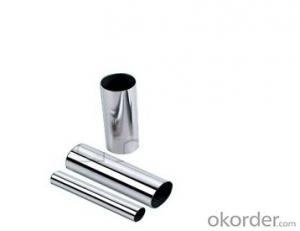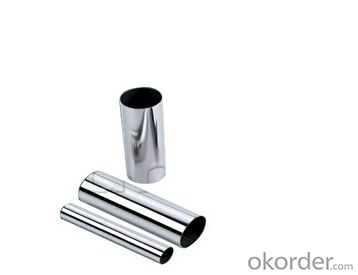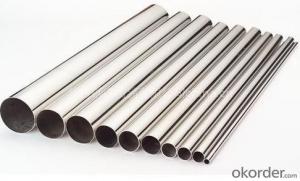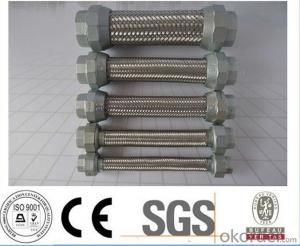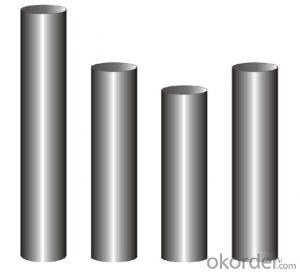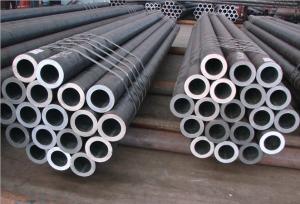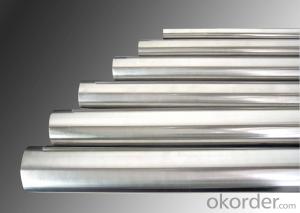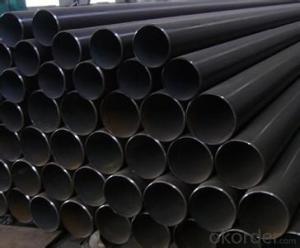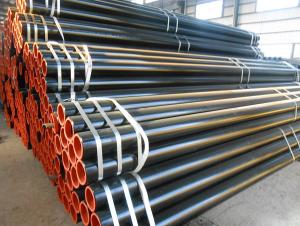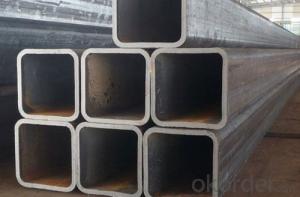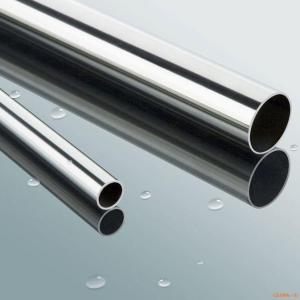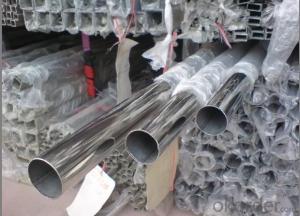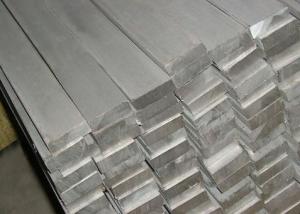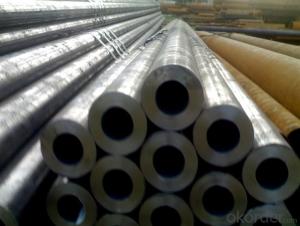Thin Wall Small Diameter Stainless Steel Tubing
- Loading Port:
- China Main Port
- Payment Terms:
- TT or LC
- Min Order Qty:
- -
- Supply Capability:
- -
OKorder Service Pledge
OKorder Financial Service
You Might Also Like
| Specification | |
| Material | 304:0cr18ni9, 0cr17ni8 |
| 201:1cr17mn6ni5n,1cr13mn9ni1n | |
| 316:0cr17Ni12 | |
| or as customer's request | |
| Standard | ASTM A554, Q/GBS1-2005, customers' requests available |
| Size(Round Pipe) | 9.5mm,12.7mm,15.9mm,17mm,18mm,19.1mm,20mm,21mm |
| 22.2mm,23mm,25.4mm,28mm,31.8mm,35mm,38.1mm, | |
| 48mm,50.8mm,60mm,63.5mm,73mm,76.2mm,88.9mm, | |
| 101.6mm,114.3mm,127mm,133mm,159mm,168mm,219mm, | |
| (or customized) | |
| Thickness | 0.24mm-3.0mm |
| Length | 6m or according to customers' request |
| Outer diameter | 6.35mm-219mm |
| Tolerance | Outer diameter:±0.2mm |
| Thickness:±0.05mm | |
| Length:±0.5mm | |
| Process Method | Cold drawn, Annealed with nitrogen protection, Ultrasonic welding, |
| Automatic shape, Polished, Packing. | |
| Ends | In plain end or bevelled ends or as customers' requirements |
| Finishing | A. Sanded |
| B. 400#-600# mirror | |
| C. Hairline brushed | |
| D. TIN titanlum plated | |
| E. HL brushed & mirror(two kinds of finishing for one pipe) | |
| Inner Packing | Plastic bag |
| Outer Packing | Standard gunny packed for each bundle, around 300-500kgs per |
| bundle, or customized according to customers' requests | |
| Application | Heat Interchangers and heaters |
| Decorations, constructions | |
| Oil and chemical industry | |
| Food industry and pharmaceutical industry | |
| Ship-building and automobile manufacturing | |
| Water transportation systems | |
| Performance | Rustless, stainless, good corrosion resistance, anti-wearing, good |
| appearance, excellent mechanical properties | |
| Certification | ISO, SGS,BV. |
| Welding Line Type | ERW(Electrical Resistance Weld) |
| Delivery Detail | 15~25 days, depends on customers' order quantity |
FAQ of Stainless Steel Tubing :
①How is the quality of your products?
Our products are manufactured strictly according to national and internaional standard, and we take a test on every pipe before delivered out. If you want see our quality certifications and all kinds of testing report, please just ask us for it.
Guaranteed: If products’ quality don’t accord to discription as we give or the promise before you place order, we promise 100% refund.
②How about price?
Yes, we are factory and be able to give you lowest price below market one, and we have a policy that “ for saving time and absolutely honest business attitude, we quote as lowest as possible for any customer, and discount can be given according to quantity”,if you like bargain and factory price is not low enough as you think, just don’t waste your time.Please trust the quotation we would give you, it is professional one.
③Why should you chose us?
Chose happens because of quality, then price, We can give you both.Additionally, we can also offer professional products inquiry, products knowledge train(for agents), smooth goods delivery, exellent customer solution proposals.Our service formula: good quality+good price+good service=customer’s trust
SGS test is available, customer inspection before shipping is welcome, third party inspection is no problem.
Any question, pls feel free to contact us !
Stainless Steel Tubing Images
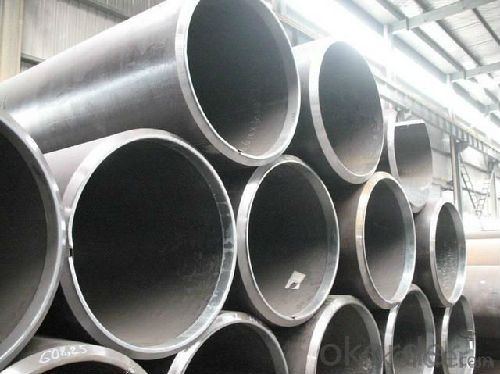
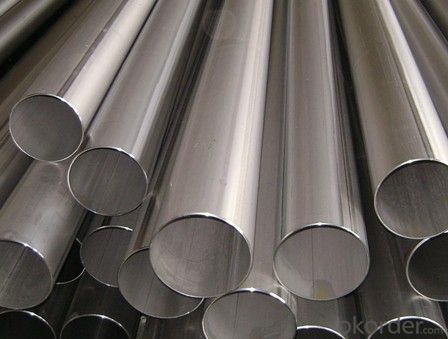
- Q: What are the different types of stainless steel pipe elbows?
- There are several different types of stainless steel pipe elbows, each designed for specific applications and requirements. Some of the common types include: 1. 90-degree elbow: This type of elbow is the most commonly used and is designed to change the direction of the pipe by 90 degrees. It is available in different sizes and materials to suit various needs. 2. 45-degree elbow: Similar to the 90-degree elbow, the 45-degree elbow is used to change the pipe direction but at a smaller angle of 45 degrees. It is often used in situations where a sharper change in direction is required. 3. Long radius elbow: This type of elbow has a larger radius, resulting in a smoother flow of fluids. It is commonly used in applications where the flow rate is critical, such as in the oil and gas industry. 4. Short radius elbow: As the name suggests, the short radius elbow has a smaller radius compared to the long radius elbow. It is often used in tight spaces where a sharp change in direction is necessary. 5. Reducing elbow: This type of elbow is used when the pipe size needs to be reduced, resulting in a change in the diameter of the pipe. It is commonly used in plumbing systems where different pipe sizes need to be connected. 6. Welded elbow: Welded elbows are fabricated by joining two separate sections of pipe using welding techniques. They are strong and durable, making them suitable for high-pressure applications. 7. Threaded elbow: Threaded elbows have female threads on both ends, allowing them to be easily connected to other threaded pipes or fittings. They are commonly used in plumbing systems and can be easily disassembled if needed. 8. Flanged elbow: Flanged elbows have flanges on both ends, which are bolted together to create a secure connection. They are often used in applications that require frequent disassembly or where a high level of strength is required. These are just a few examples of the different types of stainless steel pipe elbows available in the market. The choice of elbow depends on the specific requirements of the application, such as the pipe size, fluid flow rate, pressure, and temperature. It is important to select the appropriate type of elbow to ensure efficient and safe operation of the piping system.
- Q: Can stainless steel pipes be insulated with polyacrylonitrile?
- Indeed, polyacrylonitrile (PAN) can be employed to insulate stainless steel pipes. PAN, a highly adaptable and widely utilized polymer, boasts exceptional thermal insulation capabilities. Thanks to its low thermal conductivity and resistance to heat transfer, PAN is frequently utilized as a foam or fiber insulation material. Applying PAN insulation to stainless steel pipes is a straightforward process that aids in minimizing heat loss or gain, enhancing energy efficiency, and averting condensation. Furthermore, it affords protection against corrosion and mechanical harm.
- Q: Are stainless steel pipes fire-resistant?
- Yes, stainless steel pipes are fire-resistant. Stainless steel is known for its high melting point and excellent resistance to fire. It does not readily ignite or contribute to the spread of fire, making it a safe material for various applications, including pipes. Stainless steel pipes can withstand high temperatures without significant deformation or structural damage, providing an added level of safety in fire-prone environments.
- Q: What is the difference between 409 and 316 stainless steel pipes?
- The main difference between 409 and 316 stainless steel pipes lies in their chemical composition and properties. 409 stainless steel is a ferritic stainless steel known for its good corrosion resistance, high temperature resistance, and relatively low cost. It is commonly used in automotive exhaust systems and other applications where corrosion resistance is important. On the other hand, 316 stainless steel is an austenitic stainless steel with superior corrosion resistance compared to 409. It contains molybdenum, which enhances its resistance to corrosion by various chemicals, acids, and saltwater. 316 stainless steel pipes are often used in marine environments, food processing plants, and other applications where exceptional corrosion resistance is required. In summary, while both 409 and 316 stainless steel pipes offer corrosion resistance, 316 stainless steel provides higher resistance to corrosion in a wider range of environments, making it more suitable for demanding applications.
- Q: How do you prevent condensation in stainless steel pipes?
- To prevent condensation in stainless steel pipes, it is important to insulate the pipes properly. This can be done by using insulation materials specifically designed for pipes, such as foam or fiberglass insulation. Additionally, ensuring that the pipes are properly sealed and free from any leaks will also help minimize condensation. Proper ventilation in the area around the pipes can also help reduce moisture buildup and prevent condensation from occurring.
- Q: Can stainless steel pipes be used for oil and gas refineries?
- Yes, stainless steel pipes can be used for oil and gas refineries. Stainless steel offers excellent corrosion resistance, high strength, and durability, making it suitable for handling various corrosive fluids and gases in the refining process. Additionally, stainless steel pipes can withstand high temperatures and pressures, ensuring the safe and efficient transportation of oil and gas in refineries.
- Q: Can stainless steel pipes be used for pharmaceutical industries?
- Indeed, stainless steel pipes find utility within the pharmaceutical industries. Owing to its exceptional resistance to corrosion, durability, and hygienic qualities, stainless steel is widely employed in this sector. Its ability to withstand chemicals, high temperatures, and moisture renders it suitable for diverse applications throughout the pharmaceutical manufacturing processes. Stainless steel pipes frequently serve the purposes of conveying and preserving pharmaceutical products, as well as facilitating the distribution of purified water, steam, and other fluids. Moreover, stainless steel is easily cleaned and maintained, a vital aspect in guaranteeing the cleanliness and sterility mandated in pharmaceutical facilities.
- Q: What is the difference between ERW and EFW stainless steel pipes?
- ERW (Electric Resistance Welded) stainless steel pipes are manufactured by rolling a flat steel into a cylindrical shape and then welding the edges together using electric resistance heat. On the other hand, EFW (Electric Fusion Welded) stainless steel pipes are produced by melting the edges of two steel plates or strips and then welding them together using an electric current. The main difference between ERW and EFW stainless steel pipes lies in the welding process, with ERW pipes having a smoother internal surface due to the absence of filler material, while EFW pipes have a slightly thicker weld seam. Additionally, EFW pipes are generally used for larger diameters and thicker walls, whereas ERW pipes are commonly used for smaller diameters and thinner walls.
- Q: How do you calculate the weight of a stainless steel pipe?
- In order to determine the weight of a stainless steel pipe, it is necessary to have knowledge of its dimensions and the density of stainless steel. To begin with, the outer diameter (OD) and wall thickness (WT) of the pipe should be measured. To obtain precise measurements, employ a caliper or ruler. Following that, the inner diameter (ID) can be calculated by subtracting twice the wall thickness from the outer diameter. The formula for determining the ID is: ID = OD - 2 * WT. Subsequently, employ the formula A = π * ((OD/2)^2 - (ID/2)^2), where π is approximately 3.14159, to calculate the cross-sectional area (A) of the pipe. Next, locate the density of stainless steel. While the density may slightly differ depending on the specific grade of stainless steel, the average value is approximately 7.9 grams per cubic centimeter (g/cm³) or 7900 kilograms per cubic meter (kg/m³). Lastly, multiply the cross-sectional area (A) by the length of the pipe (L) and the density (D) to determine the weight. The formula for calculating the weight (W) is: W = A * L * D. Ensure that consistent units are used throughout the calculations. For instance, if the length is measured in meters, the weight will be expressed in kilograms. If the length is measured in inches, the weight will be expressed in pounds.
- Q: Can stainless steel pipes be used for petrochemical applications?
- Yes, stainless steel pipes can be used for petrochemical applications. Stainless steel is highly resistant to corrosion and can withstand high temperatures, making it suitable for transporting and storing petrochemicals safely and efficiently.
Send your message to us
Thin Wall Small Diameter Stainless Steel Tubing
- Loading Port:
- China Main Port
- Payment Terms:
- TT or LC
- Min Order Qty:
- -
- Supply Capability:
- -
OKorder Service Pledge
OKorder Financial Service
Similar products
Hot products
Hot Searches
Related keywords
